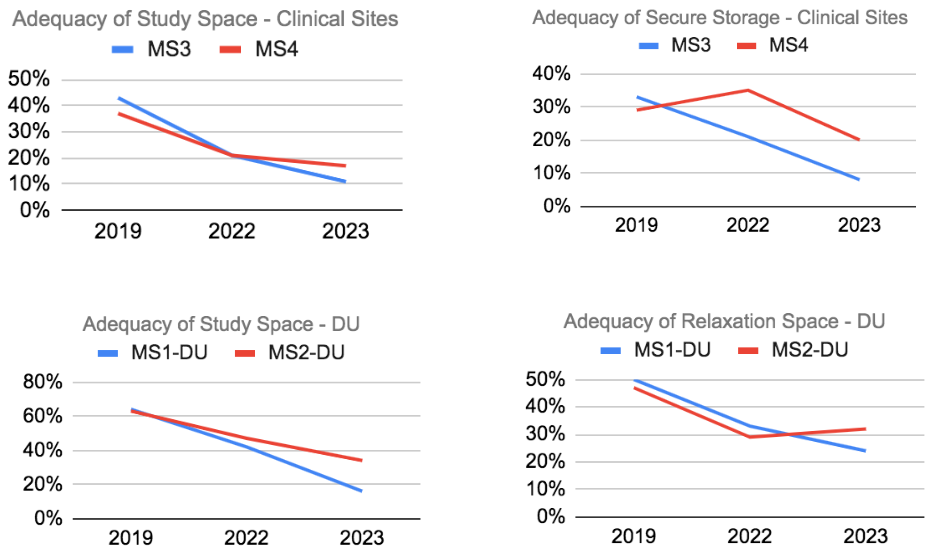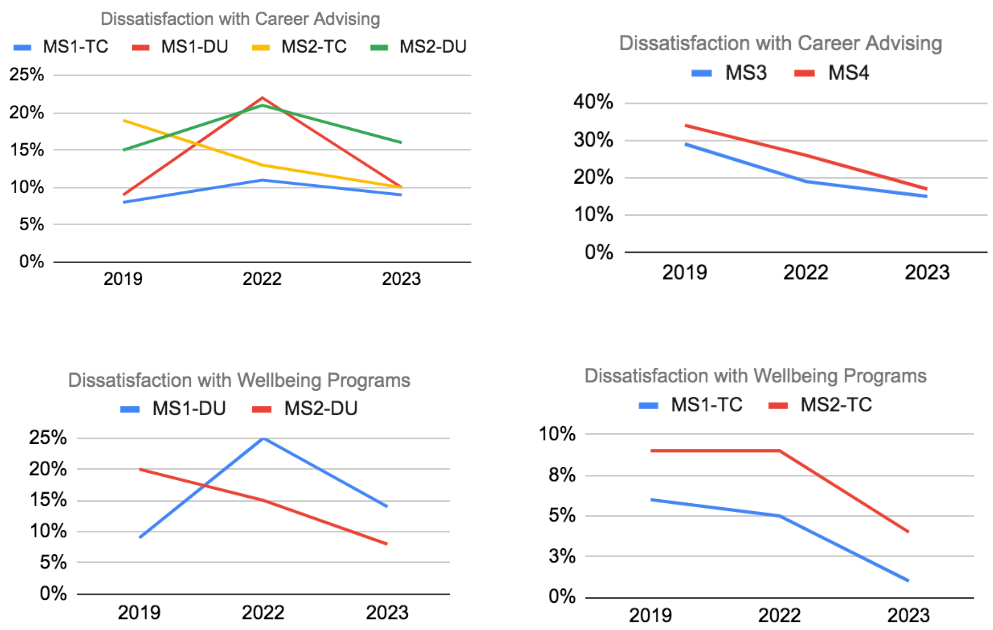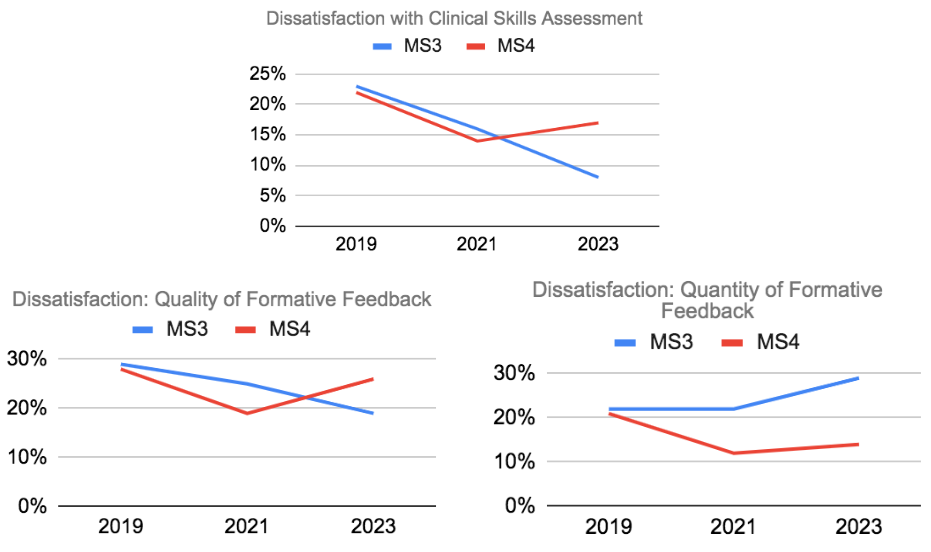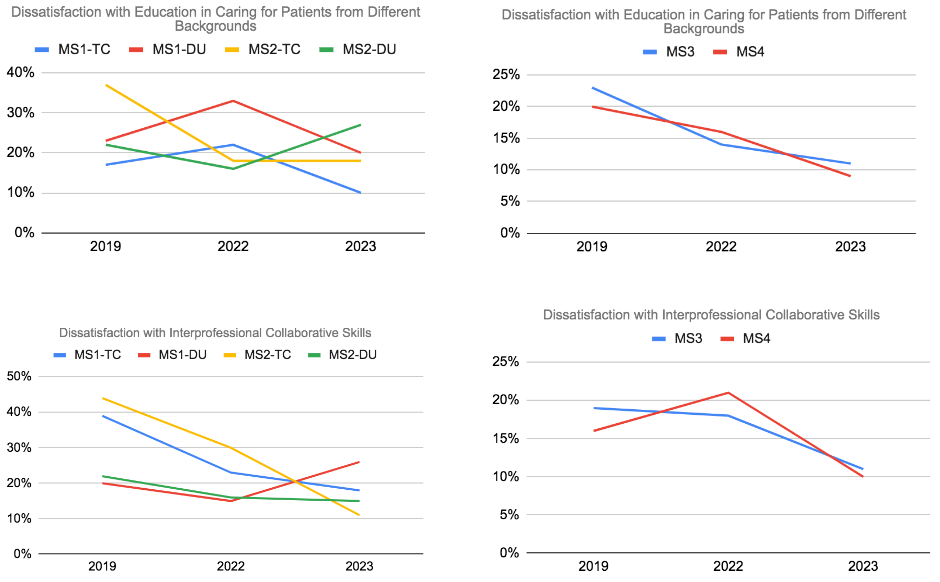Student Voice
The Roadmap to Improvement
Thank you to those of you who took the time to complete the annual Quality Improvement Satisfaction survey distributed throughout the spring 2023 term. Your feedback is essential to the medical school’s continuous quality improvement efforts and in meeting accreditation (LCME) requirements.
The results to questions related to the UMMS’ current LCME citations are summarized below. In order to see trends, the 2023 survey results are provided alongside results from surveys conducted in 2019 and 2022. Based on the results, teams are identifying ways to sustain areas of strength and improve challenge areas.
Questions related to the survey results, our improvement plans, or the LCME can be directed to Joseph Oppedisano, Director of Accreditation and Quality Improvement at joppedis@umn.edu.
Facilities
Opportunities for Improvement: There has been higher dissatisfaction among clerkship students with study and storage spaces at some hospitals & clinical sites. In addition, students on the Duluth Campus have reported higher dissatisfaction with study and relaxation spaces.
Duluth MS1 and MS2 students were asked about their satisfaction with on-campus study and relaxation spaces. In addition, MS3 and MS4 students were asked about their satisfaction with secure storage and study spaces at clinical sites used for required clerkships.
Survey Findings:
- Dissatisfaction with on campus student and relaxation space in Duluth has steadily declined since 2019. The decline in dissatisfaction is extremely heartening and provides a strong indication that recent efforts to improve DU spaces are having the intended effect. Work is being done over the 23-24 AY to continue to reduce dissatisfaction to below 20%
- Dissatisfaction among MS3 and MS4 students with secure storage and study spaces at clinical sites has significantly declined since 2019. The commitment by the Dean to purchase secure storage at key clinical sites, and the improvement of communication efforts to students about clinical facilities have had a notable impact in this area. Ongoing monitoring of clerkship evaluations will be conducted to ensure we sustain these improvements

Career Advising & Wellbeing
Opportunities for Improvement: Historically, the medical school has struggled with student satisfaction with career advising. A 2019 survey showed high dissatisfaction among clerkship students with the career advising system. Significant efforts have been made since that time to address student concerns, including the hiring of a Career Advising Coordinator and expansion of the Career Advising Office.
In the 2022 survey, some students reported higher dissatisfaction with the adequacy of programs to support well-being, especially among Duluth students.
Students were asked about their satisfaction with the adequacy of career advising, elective counseling, and availability of programs to support well-being.
Survey Findings:
- Student dissatisfaction with the adequacy of career advising has seen substantial improvement over the 2022 survey and is below 20% (the medical school’s target for dissatisfaction)
- Year 2 students on both campuses reported higher dissatisfaction with elective counseling over previous surveys. This was likely due to the different timing of the survey in 2023, which occurred after the clerkship scheduling process. This finding provides the school with important information about improvement opportunities previously overlooked. Efforts are being made to implement quality improvement plans that address issues raised by students, in preparation for the spring 2024 clerkship scheduling phase.
- Dissatisfaction among students with the availability of well-being programs on both campuses has substantially improved since the 2022 survey. This is an indication that efforts to enhance community through increased programs and services has had the intended effect.


Assessment & Evaluation
Opportunities for Improvement: The medical school needed to demonstrate improvements in students reporting they were observed performing the essential components of the history and physical/mental status exam.
Some Clerkships were also under-performing with regard to the provision of mid-clerkship feedback and with student satisfaction with the quantity and quality of formative feedback.
Clerkship students were asked about their satisfaction with clinical skills assessment and with the quantity & quality of formative (mid-clerkship) feedback.
Survey Findings:
- Dissatisfaction among MS3 and MS4 students with clinical skills assessment (Observation of H&P) has notably improved since 2019 with rates below 20% for both classes
- Dissatisfaction with the quality of formative feedback has shown improvement among MS3 students during their core clerkship year. MS4 students continued to have higher dissatisfaction and continued efforts to improve the quality of formative feedback, especially within the EPA Assessment Program, is required.
- Dissatisfaction with the quantity of formative feedback continues to be an area of challenge, with MS3 students reporting increased levels of dissatisfaction of 29%. Based on the recommendations from a Working Group over the 22-23 AY, the number of EPA Assessments has been reduced from 4/week to 3/week. Additional improvement strategies are also being explored.

Curriculum
Opportunities for Improvement: With regard to curriculum on caring for patients from different backgrounds the student satisfaction has improved across all classes and both campuses, with the exception of Year 1 students.
With regard to curriculum in Interprofessional Collaborative Skills (IPE), student satisfaction has continued to improve overall. An increase in dissatisfaction among DU Year 1 students was noted. The medical school continues to work to identify opportunities around IPE in the curriculum in ways that sustain or improve student satisfaction.
Over the past several years, the medical school has implemented a number of initiatives to address workload. Student satisfaction with workload has improved and is below 20% for all classes and both campuses. Ongoing monitoring is required to ensure student satisfaction is maintained.
Students were asked about their satisfaction with Education in Caring for Patients from Different Backgrounds, their satisfaction with interprofessional Collaborative Skills, and about their satisfaction with the overall workload. NOTE: not all classes were asked the same set of questions.
Survey Findings:
- MS3 and MS4 satisfaction with both education in caring for patients from different background and with interprofessional collaborative skills continues to improve over previous surveys, and remains below our 20% target
- MS1 and MS2 student dissatisfaction has been improved for education in caring for patients from different backgrounds with the exception of MS2 DU; MS1 and MS2 student dissatisfaction has been improved for interprofessional collaborative skills with the exception of MS1 DU
- Dissatisfaction among Twin Cities students has significantly improved over both the 2022 survey and the 2019 survey with regard to overall workload; MS1 and MS2 student dissatisfaction remains below our target of 20%, with a slight increase in dissatisfaction among MS1 DU students

